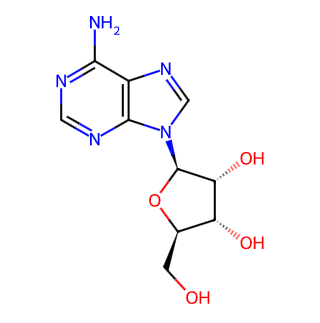- Synthetic anti-infective drugs
- Medications for the digestive system
- Antipyretic and analgesic drugs
- Medications for the blood system
- Medications for the respiratory system
- Anti-allergic drugs
- Medications for the urinary system
- Diagnostic medications
- Immunosuppressive and immunomodulatory drugs
- Vitamins and mineral supplements
- Antioxidants and medications for osteoporosis
- Antiparasitic drugs
- Ophthalmic medications
- Amino acids and their derivatives
- Dermatological medications
- Medications for the circulatory system
- Antitumor drugs
- Medications for the nervous system
- Hormonal and endocrine function-regulating drugs
- Antibiotics
- Others
CAS NO.: 58-61-7




Basic Information
Chinese Name: 腺苷
English Name: Adenosine
CAS Number: 58-61-7
Molecular Formula: C10H13N5O4
Molecular Weight: 267.24
Physical and Chemical Properties
Melting Point: 234-236°C
Boiling Point: 676.3°C at 760 mmHg
Density: 2.08 g/cm³
Solubility: Slightly soluble in water, soluble in hot water, practically insoluble in ethanol (96%) and dichloromethane, but soluble in dilute mineral acids and dimethyl sulfoxide
Specific Rotation: [-61.7° (C=0.706, water); -58.2° (C=0.658, water)]
Uses
Biochemistry: Adenosine is an important endogenous nucleoside in living organisms. It can directly enter cardiomyocytes and be phosphorylated to generate adenosine monophosphate (AMP), participating in myocardial energy metabolism. It also contributes to dilating coronary vessels and increasing blood flow.
Pharmaceuticals:
Used in the treatment of cardiovascular diseases such as angina pectoris, myocardial infarction, and coronary insufficiency.
Has antiarrhythmic effects, converting paroxysmal supraventricular tachycardia to sinus rhythm.
Used in the treatment of arteriosclerosis, essential hypertension, cerebrovascular disorders, sequelae of stroke, and progressive muscular atrophy.
Biochemical Research: Acts as an essential raw material for scientific research, used in the synthesis of adenosine triphosphate (ATP), adenine, adenosine acid, and arabinosyladenine.
Storage and Transportation
Storage: Should be stored in a cool, dry place, protected from direct sunlight, with a temperature controlled at 2-8°C.
Transportation: Typically shipped via express delivery or logistics. Domestic express delivery usually arrives within three days, while logistics takes approximately five days.
Safety Information
Respiratory Protection: Respiratory protection is generally not required when handling adenosine. However, for dust protection, N95 (US) or P1 (EN143) dust masks can be used.
Environmental Hazards: According to international transportation regulations, adenosine is classified as a non-hazardous material.

Tai Yau Street, San Po Kong, Kowloon, Hong Kong, China.



